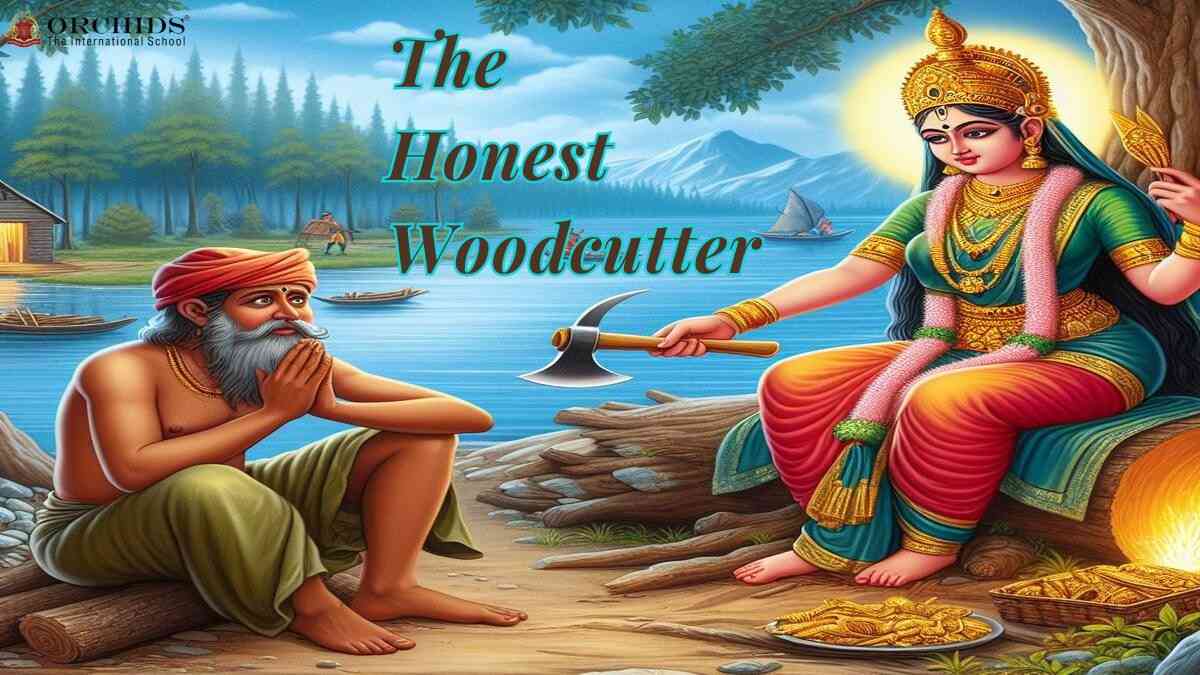The Honest Woodcutter Story for Kids

The Honest Woodcutter Story
A devoted and hardworking woodcutter lives in a small village, verdant woodland tucked between undulating hills. His existence was uncomplicated and centered on the magnificent trees encircling him. Along with his axe skills, the woodcutter was well-known for his uncompromising devotion to honesty.
One peaceful morning, as the woodcutter traveled into the center of the forest, the sun's golden rays filtering through the thick canopy. Rusty and scarred from years of work, his faithful axe was by his side all the time. He chopped down trees with each swing so he could support his family.
However, on this fatal day, he was working beside a peaceful lake when he suddenly lost focus, allowing his reliable axe to escape his grasp. With a loud splash, it dropped into the lake's crystal-clear waters and vanished beneath the surface. The woodcutter's lone source of income had collapsed in front of his unbelieving eyes.
As he stood on the side of the lake, staring at the ripples that indicated the axe's wet grave, the woodcutter overcame it with desperation. Knowing he would not be able to support his dear family without the axe broke his heart. His dreams crushed, he fell to the ground as the weight of hopelessness crashed down on him.
A shimmering figure started to emerge from the lake's depths as he sat there in despair. It was a water fairy, luminous and ethereal in form. She asked, quite softly, why the woodcutter was so lonely.
He then informed the fairy about the loss of his beloved axe's passing with a sorrowful heart. The woodcutter added that he was afraid for his family's future because it was his only tool and his source of income.
The water fairy elegantly sank into the glistening waters of the lake, moved by the honesty and sincerity in the woodcutter's gaze and voice. She reappeared a little while later, carrying two axes. The woodcutter had misplaced his trusty old tool, but one had a shiny golden axe that appeared to give out warmth.
The water fairy asked the woodcutter a vital question as she handed him both axes with a gentle smile: "Is this your axe?" The woodcutter saw the golden axe and his eyes became wide with awe and temptation, but he knew what was really his. His response was straightforward and honest: "No, the golden axe is not mine."
The water fairy's heart swelled with admiration for the woodcutter's honesty. She was deeply moved by his integrity in the face of such temptation. As a reward for his unwavering truthfulness, she not only returned his lost axe but also allowed him to keep the golden one as a bonus. The woodcutter's heart was filled not only with gratitude but also with a profound understanding of the value of honesty.
The woodcutter's life experienced a tremendous transformation over time. News of the truthful woodcutter who had given back a golden axe while no one was looking quickly caught on. People came from far and wide to hire him because they knew they could rely completely on him. The woodcutter's family prospered, and he rose to prominence in his neighborhood.
Moral of the Story :
The classic story of "The Honest Woodcutter" emphasizes a basic principle: the best policy is honesty. Because he chose honesty over dishonesty, the woodcutter's life took a positive turn and he became an inspiration to future generations.One of the greatest ever testimonials to the value of honesty in life is "The Honest Woodcutter." We may teach today's impressionable young minds the vital moral lesson of truthfulness by telling them this painstakingly researched story and delving into its subtleties, so fostering their development into responsible and honorable adults in the future.
FAQs for the story "The Honest Woodcutter":
1. Who wrote the story of "The Honest Woodcutter," and where can we read it?
The story is attributed to Aesop, an ancient Greek storyteller. "The Honest Woodcutter" is commonly found in collections of Aesop's Fables, available in various literature anthologies, online platforms, and dedicated fable compilations.
2. Are there other notable fables by Aesop?
Yes, Aesop's Fables include a vast collection of moral stories. Some well-known ones include "The Boy Who Cried Wolf," "The Tortoise and the Hare," and "The Fox and the Grapes."
3. Are there cultural variations of "The Honest Woodcutter" story?
Yes, different cultures have their own versions of the story, often with unique details. In India, for example, a similar tale is found in the Panchatantra, known as "The Gold-Giving Serpent."
4. What other fables share the theme of honesty and integrity?
Aesop's Fables offer several stories with similar themes. "The Shepherd Boy and the Wolf" and "The Farmer and the Snake" are examples that highlight the consequences of honesty and trust.
5. How has "The Honest Woodcutter" influenced popular culture?
The story has inspired adaptations in literature, theater, and film. Its enduring moral lesson has also been referenced in various forms of media, contributing to its lasting impact on popular culture.
6. Can you recommend modern books or films that explore similar moral lessons?
Modern works such as "The Giving Tree" by Shel Silverstein and Disney's "The Lion King" delve into themes of honesty, integrity, and the consequences of one's actions, making them worthwhile explorations for those interested in moral tales.
Other Related Sections
NCERT Solutions | Sample Papers | CBSE SYLLABUS| Calculators | Converters | Stories For Kids | Poems for kids| Learning Concepts I Practice Worksheets I Formulas | Blogs | Parent Resource

